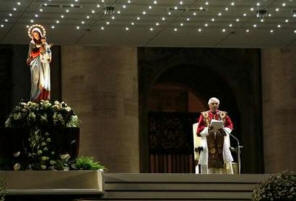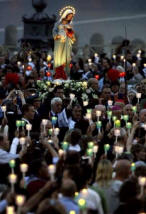|
Pope Benedict XVI- Addresses |
"Blessed is She Because She Believed"
 Address
of H.H. Pope Benedict XVI at the End of the Marian Month of May Address
of H.H. Pope Benedict XVI at the End of the Marian Month of May
St. Peter's Square
May 31, 2008
Dear Brothers and Sisters!
We conclude the month of May with this suggestive meeting of
Marian prayer. I greet you with affection and I thank you for
your participation. I greet, first of all, Cardinal Angelo
Comastri; along with him I also greet the other cardinals,
archbishops, bishops and priests who have participated in this
evening celebration.
I extend my greeting to all consecrated persons and to you, my
dear lay faithful, who have desired to offer homage to the Most
Holy Virgin with your presence. This day we celebrate the feast
of the Visitation of the Blessed Virgin and the memorial of the
Immaculate Heart of Mary.
All of this invites us to cast our gaze upon Mary with trust. To
her, again this evening, we turn with the ancient and always
relevant holy practice of the rosary. The rosary, when it is not
a mechanical repetition of traditional formulas, is a biblical
meditation that permits us to reflect on the events of the
Lord’s life in the company of the Blessed Virgin, treasuring
them, as she did, in our heart.
In many Christian communities there is the beautiful custom of
reciting the rosary in a more solemn way together with the
family and in parishes. Now that the month is ending, this good
practice should not also end; indeed it should be continued with
a still greater commitment, so that, in the school of Mary, the
lamp of faith may shine ever brighter in the heart of Christians
and in their houses.
On today’s feast of the Visitation the liturgy invites us to
listen again to the passage of the Gospel of Luke that retells
the journey of Mary from Nazareth to the house of he elderly
cousin Elizabeth. Let us imagine the state of the Virgin after
the Annunciation, when the angel left her. Mary found herself
with a great mystery in her womb; she knew that something
extraordinarily unique had happened; she realized that the last
chapter in the history of the world’s salvation had begun. But
everything around her remained as it was before, and the village
of Nazareth knew nothing of that which had happened to her.
Before being concerned about herself, Mary thinks rather of the
elderly Elizabeth, whom she knew was already in an advanced
stage of pregnancy, and, driven by the mystery of love that she
had just received into herself, she made her way “with haste” to
go help Elizabeth. This is the simple and sublime greatness of
Mary!

When she arrived at Elizabeth’s house, something happened that
no painter could ever render with the same beauty and profundity
as the actual event. The interior light of the Holy Spirit
enveloped them. And Elizabeth, enlightened from on high,
exclaims: “Blessed are you among women and blessed is the fruit
of your womb! To what do I owe this visit of my Lord’s mother to
me? As soon as the sound of your greeting reached my ears, the
child leapt for joy in my womb. Blessed is she who believed in
the fulfillment of the Lord’s words” (Luke 1:42-45).
These words might seem to be excessive to us given the actual
context. Elizabeth is one of the many elderly women in Israel,
and Mary is an unknown girl from a remote village of Galilee.
What can they be and what can they do in a world in which other
persons count and other powers hold sway? Nevertheless, Mary
once again stupefies us; her heart is limpid, totally open to
God’s light; her soul is without sin, not weighed down by pride
and by egoism.
Elizabeth’s words ignite a canticle of praise in her heart,
which is an authentic and profound “theological” reading of
history: a reading that we must continually learn from her whose
faith is without shadows and without cracks. “My soul proclaims
the greatness of the Lord.” Mary acknowledges God’s greatness.
This is the first indispensable sentiment of faith; the
sentiment that gives certainty to the human creature and
liberates the creature from fear, even in the midst of history’s
storms.
Going beyond the surface, Mary “sees” with the eyes of faith
God’s work in history. For this reason she is blessed, because
she believed: by faith, in fact, she welcomed the word of the
Lord and conceived the incarnate Word. Her faith allowed her to
see that the thrones of the powerful of this world are all
provisional, while the throne of God is the only rock that does
not change and does not fall. And Mary’s “Magnificat,” after
centuries and millennia, remains the truest and the deepest
interpretation of history, while the readings of the many wise
persons of this world have been disproved by the facts over the
course of the centuries.
Dear brothers and sisters! Let us return home with the
Magnificat in our heart. Let us carry in us Mary’s same
sentiments of praise and thanksgiving to the Lord, her faith and
her hope, her docile abandonment into the hands of divine
providence. Let us imitate her example of availability and
generosity in serving our brothers and sisters. In fact, we are
only able to raise a canticle of praise to the Lord by welcoming
God’s love and making of our existence a disinterested and
generous service of neighbor. May the Madonna obtain this grace
for us, she who this night invites us to find refuge in her
immaculate heart.
[Translation by Joseph G. Trabbic]
© Copyright 2008 - Libreria Editrice Vaticana
Look at the One they
Pierced!
This page is the work of the Servants of the Pierced Hearts of Jesus and
Mary
|